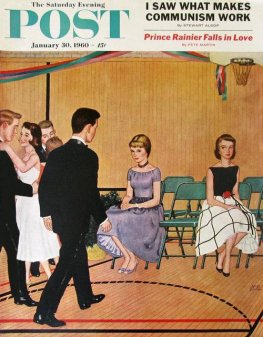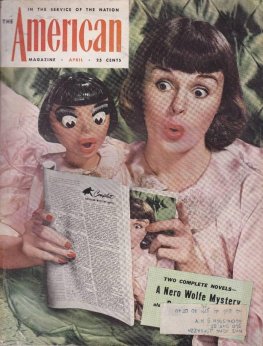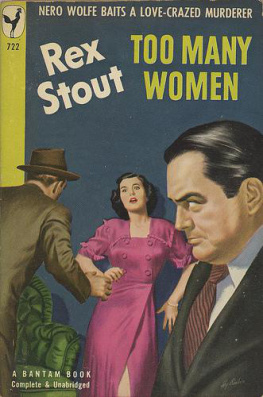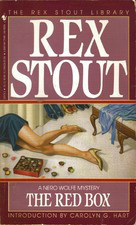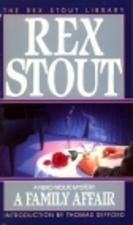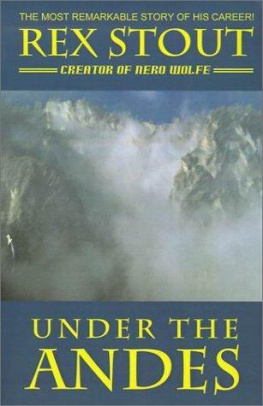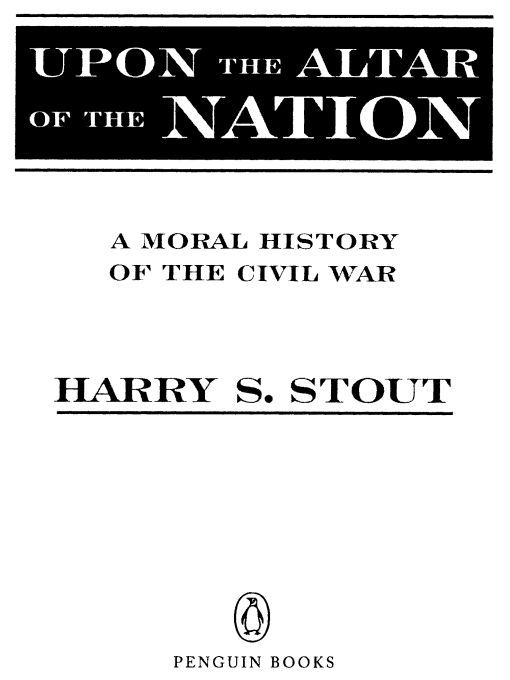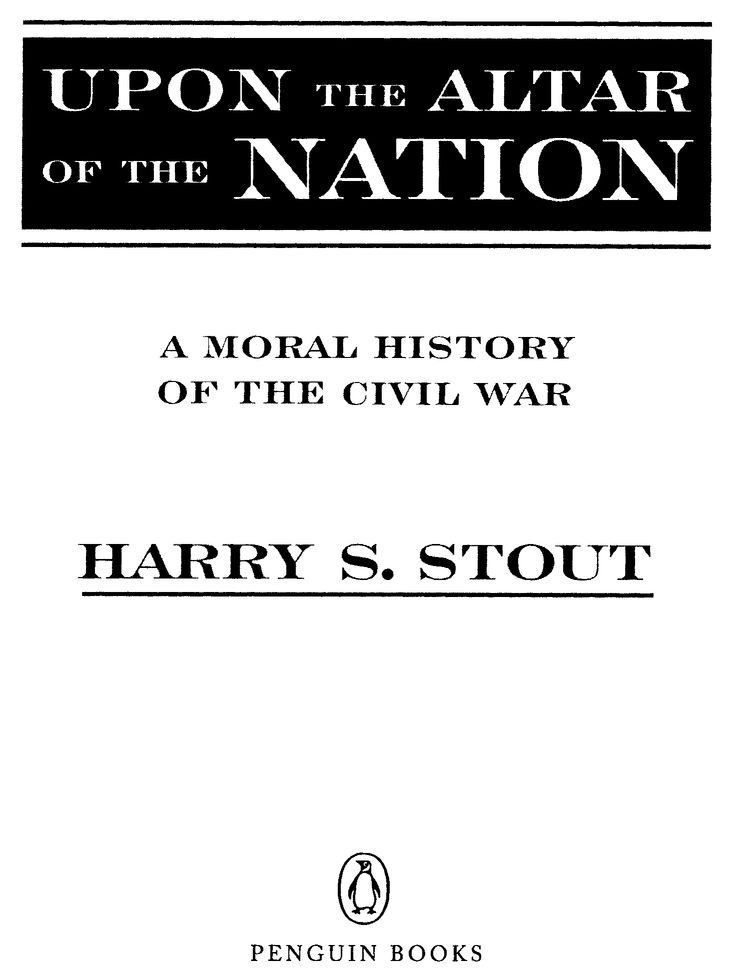Table of Contents
PENGUIN BOOKS
UPON THE ALTAR OF THE NATION
Harry S. Stout is the Jonathan Edwards Professor of American Religious History at Yale University and the author of The New England Soul. He has received an N. E. H. Research Fellowship and a Guggenheim Foundation Fellowship, among other awards. Currently the editor of the twenty-seven volume series of The Works of Jonathan Edwards, Professor Stout has co-edited the seventeen-volume series Religion and American Life designed for public schools.
To the memory of my father, Harry Stober Stout (19232004), a warrior sailor in a just war. And to my grandchildren: James Benjamin Klapwijk, Helena Neeltje Klapwijk, and Wendell McCullough Stout. It is to the coming generation and the moral conclusions they reach that this book is ultimately dedicated.
INTRODUCTION
In the critical months of spring 1864, when Union and Confederate armies suffered horrendous and unprecedented casualties, Grants Army of the Potomac faced Lees Army of Northern Virginia in an area of open pines and deep ravines called Cold Harbor, Virginia. Both sides had already expended sixty-nine thousand casualties in four weeks of frontal assaults. Soldiers and their commanders were exhibiting unmistakable signs of shell shock. In the mistaken belief that Lees lines were spread too thin, Grant ordered yet another frontal assault on June 3 intended to break through Lees soft underbelly, roll up his army, and march on the gates of Richmond.
At 4:30 a.m. the assault began. In lockstep madness, each advancing Union corps was enfiladed by Lees cannon and musket fire on the flanks while simultaneously receiving direct fire in front. Artillery batteries worked their Napoleons furiously with double charges of canister, turning the assault troops into a bloody mass of writhing humanity. Three assaulting Federal corps were repulsed in little over an hour, with staggering losses that totaled 7,000a rate of roughly 116 men per minute. In surveying the carnage, Lees horrified general Evander Law would write of the battle: It was not war, but murder.
But was it murder? Talk about war or murder, right or wrong, is moral talk. And talk of past war or murder, right or wrong, is moral historythat is, professional history writing that raises moral issues of right and wrong as seen from the vantage points of both the participants and the historian, who, after painstaking study, applies normative judgments. Insofar as ordinary language is implicitly ethical, all history writing implies moral discernment; a moral history, however, calls more for a determination of right or wrong.
The historian writing a moral history does not presume to be a sort of Supreme Court justice adjudicating the past, trying actors for their crimes and then sentencing them. The dead no longer care, and they cannot be sentenced. Rather, it is for the living that the historian offers moral judgments in the hope that lessons for life today may ensue. Reflecting on a career of scholarship on Indian-white relations, the historian James Axtell observes that in writing moral history, [t]he historians justice is retrospective, not contemporary, and his goal is not to punish or rehabilitate historical malefactorswho are all mortally incorrigiblebut to set the record straight for future appeals to precedent. Moral history imbues the present with a heightened sensitivity to what actors might have done, what they ought to have done, and what, in fact, they actually did. It is in the distances between the oughts and the actualities that moral judgments emerge. One bears witness to the past with all possible integrity and disinterestedness for the sake of the present and the future.
Writing a serious history of war humbles the author and discourages self-righteous pretensions to a monopoly on the Truth. Does that mean that the historian has no interpretation or point of view? Of course not. But precisely because wars past and present exist in a gray zone of differing opinions among good people, the historians primary task is to reveal the zone.
Current debates over American wars in the twenty-first century dramatically confirm the contested nature of war among good people. The reason is simple: At its most elemental, war is evil. War is killing. War is destroying. It may be a necessary evil, and in that sense right, but it is nevertheless lethally destructive. So real-world questions about war will always strain any theory created to justify it and invite debate. In telling the story of the Civil War, I pay particular attention to those aspects of the war that raise moral issues. Such issues appear on the home front and in the trenches, among foot soldiers and civilians no less than generals and statesmen. I seek first to establish a narrative that frees the reader to make his or her judgments, while admittedly drawing conclusions of my own.
How then do I, as a historian, render moral judgments about a war? By holding up the actions against widely recognized, long-established principles of just war. The subject of war should not be consigned to some random zone of pure historical relativism or postmodern agnosticism. Laws of war and rules of engagement exist that civilized peoples agree to. Such laws and rules transcend personal opinion or individual caprice. War crimes tribunals of our modern era bear eloquent testimony to the ongoing relevance of laws of war. When particular battles and wars are laid alongside the laws of just war, judgments are called for that can be applied to all participants and to nations as a whole.
The ethical standards employed to judge the rightness or wrongness of war fall under the rubric of just-war theory. Just-war theory refers to an intellectual tradition at least two millennia old designed to establish rules of war. These rules first govern whether a people are right to declare war. Once war is declared, they provide guidelines for how that war should be fought, with a view toward minimizing the violence and destruction of war and prompting a peaceful future of coexistence. Although just-war thinking is as old as warfare itself, a self-conscious body of literature on the subject in Western culture began with Saint Augustine of Hippo (354430), who raised the question of when and how to wage war justly. Its first systematic expression dates from Saint Thomas Aquinas (ca. 12251274), whose Summa theologica presents the broad categories of what becomes just-war theory. Aquinass thoughts became the foundation for later Catholic and Protestant jurists.
In the twentieth and twenty-first centuries, just-war theory has undergone a rebirth in response both to the invention and deployment of nuclear weaponry and other weapons of mass destruction and to wars in Southeast Asia and the Middle East. Perhaps the single most important study has been Michael Walzers Just and Unjust Wars, but other major scholarship appears in the work of Paul Ramsey, Jean Bethke Elshtain, Geoffrey Best, James Turner Johnson, and William V OBrien.
In opposition to both pacifism on the one hand and amoral realism (Realpolitik) on the other, just-war theory offers a series of ethical principles that articulate a plausible moral framework. Whether one is dealing with wars in the distant past or contemporary wars, two sets of principles are especially important. The first set of principles offers guidelines for when a war might justly be declared. The second set of principles offers guidelines for governing just and fair conduct in the actual fighting of the war.


